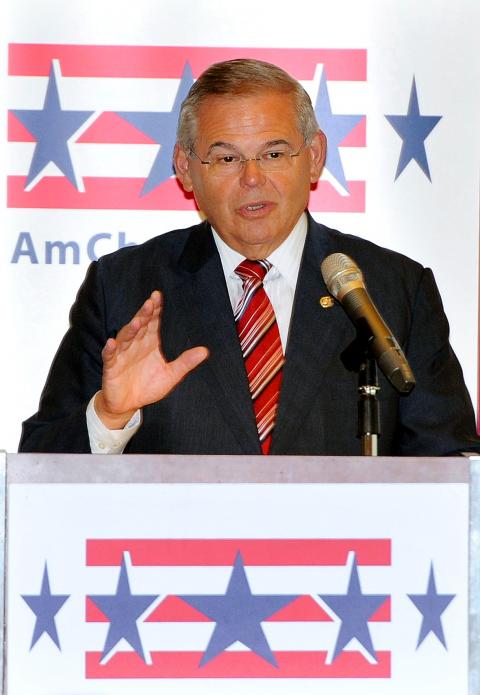US Senate Foreign Relations Committee Chairman Robert Menendez said in Taipei yesterday that he would back Taiwan’s accession to the Trans-Pacific Partnership (TPP), “provided that Taiwan is willing to support a high-standard, comprehensive agreement” to address various issues, such as labor and environment, currency manipulation and intellectual property rights.
He said the issues were “critical elements” of the proposed pact.
The senator delivered a speech titled “The Future of US-Taiwan Relations” at a luncheon hosted by the American Chamber of Commerce in Taipei yesterday, the second day of his three-day visit.

Photo: Liao Chen-huei, Taipei Times
While applauding some of the reforms Taiwan has made to open up its public procurement market after becoming a member of the WTO’s Agreement on Government Procurement in 2009, Menendez said that “some US firms continue to encounter problems relating to transparency, contract terms and conditions, licensing and liability.”
He also said he was concerned about the restrictions imposed on foreign investors in agricultural production, chemical manufacturing, public utility, transportation, telecommunications, high-speed rail and a natural gas pipeline.
With the resumption of bilateral talks under the bilateral Trade and Investment Framework Agreement (TIFA) in March, Menendez said he was confident that the US and Taiwan could continue to work together to solve the challenges of “a fully open and transparent relationship.”
Menendez said he had talked to President Ma Ying-jeou (馬英九) by telephone, and Vice President Wu Den-yih (吳敦義) and Minister of Economic Affairs Chang Chia-juch (張家祝) at separate meetings earlier in the day, saying he “looked forward to strengthening our economic partnership” under the TIFA platform.
Taiwan and the US set up a “working group on investment” during the TIFA negotiations in March to further explore issues under a bilateral investment agreement (BIA), in addition to a “working group on technical barriers to trade.”
Menendez said he had conveyed his “strong support” for a US-Taiwan BIA to US Trade Representative Michael Froman.
Over the years, Washington and Taipei have made tremendous progress in deepening bilateral relationships, Menendez said, citing the inclusion of Taiwan in the US visa waiver program, the resumption of TIFA talks, security cooperation and US legislation in support of Taiwan’s participation in the International Civil Aviation Organization as an observer, which he authored.
Menendez said that constructive and strategic US engagement in Asia was in the interests of all nations in the region and would help create a mutually beneficial future for both the US and Taiwan, as well as for the world.
The Ministry of Foreign Affairs said Menendez’s visit to Taipei is the first by the chairman of the Foreign Relations Committee since US Vice President Joe Biden visited in 2001.
Menendez’s trip to Asia is his first since becoming chairman of the committee in January.
He had meetings yesterday with Premier Jiang Yi-huah (江宜樺) and Legislative Speaker Wang Jin-pyng (王金平). Officials who were present at those meetings said Menendez brought up issues related to the controversy over the Fourth Nuclear Power Plant, the government’s policy to turn the army into an all-volunteer force and security-related matters.
The senator was also scheduled to meet with Minister of National Defense Yen Ming (嚴明).
Menendez leaves Taiwan today.

Chinese Nationalist Party (KMT) Chairman Eric Chu (朱立倫), spokeswoman Yang Chih-yu (楊智伃) and Legislator Hsieh Lung-chieh (謝龍介) would be summoned by police for questioning for leading an illegal assembly on Thursday evening last week, Minister of the Interior Liu Shyh-fang (劉世芳) said today. The three KMT officials led an assembly outside the Taipei City Prosecutors’ Office, a restricted area where public assembly is not allowed, protesting the questioning of several KMT staff and searches of KMT headquarters and offices in a recall petition forgery case. Chu, Yang and Hsieh are all suspected of contravening the Assembly and Parade Act (集會遊行法) by holding

PRAISE: Japanese visitor Takashi Kubota said the Taiwanese temple architecture images showcased in the AI Art Gallery were the most impressive displays he saw Taiwan does not have an official pavilion at the World Expo in Osaka, Japan, because of its diplomatic predicament, but the government-backed Tech World pavilion is drawing interest with its unique recreations of works by Taiwanese artists. The pavilion features an artificial intelligence (AI)-based art gallery showcasing works of famous Taiwanese artists from the Japanese colonial period using innovative technologies. Among its main simulated displays are Eastern gouache paintings by Chen Chin (陳進), Lin Yu-shan (林玉山) and Kuo Hsueh-hu (郭雪湖), who were the three young Taiwanese painters selected for the East Asian Painting exhibition in 1927. Gouache is a water-based

Taiwan would welcome the return of Honduras as a diplomatic ally if its next president decides to make such a move, Minister of Foreign Affairs Lin Chia-lung (林佳龍) said yesterday. “Of course, we would welcome Honduras if they want to restore diplomatic ties with Taiwan after their elections,” Lin said at a meeting of the legislature’s Foreign Affairs and National Defense Committee, when asked to comment on statements made by two of the three Honduran presidential candidates during the presidential campaign in the Central American country. Taiwan is paying close attention to the region as a whole in the wake of a

OFF-TARGET: More than 30,000 participants were expected to take part in the Games next month, but only 6,550 foreign and 19,400 Taiwanese athletes have registered Taipei city councilors yesterday blasted the organizers of next month’s World Masters Games over sudden timetable and venue changes, which they said have caused thousands of participants to back out of the international sporting event, among other organizational issues. They also cited visa delays and political interference by China as reasons many foreign athletes are requesting refunds for the event, to be held from May 17 to 30. Jointly organized by the Taipei and New Taipei City governments, the games have been rocked by numerous controversies since preparations began in 2020. Taipei City Councilor Lin Yen-feng (林延鳳) said yesterday that new measures by